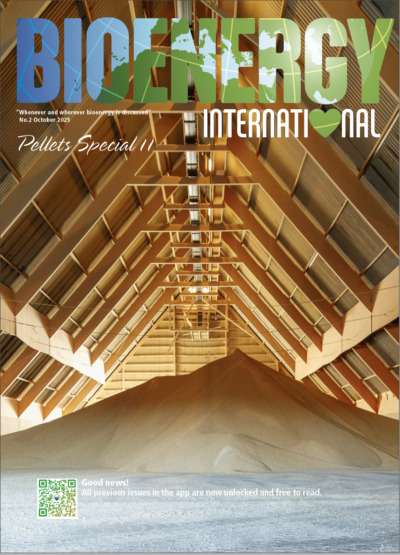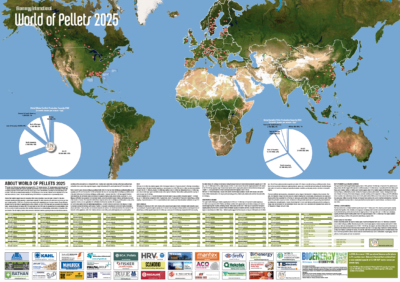E-Magazine & Maps — Available Now
Access the latest news, insights, and perspectives on bioenergy. Whether on desktop, tablet, smartphone, or in print, each issue delivers easy-to-read reports, in-depth features, and concise overviews.
Download the FREE Bioenergy International App for a smarter reading experience - get the latest issues instantly and explore our full archive anytime, anywhere!
Want even more? Subscribe to our free weekly newsletter and start every week with fresh bioenergy updates. These brief stories often don’t appear in the magazine, giving you unique insights you won’t find elsewhere. Simply return to our main page and sign up using the subscription form.
Each of our products provide a distinct flow of information. Don’t miss out — get them all. It’s completely free.
This Year’s Issues (2025)

Bioenergy Int. 1-2025
The Dawn of a New Era
Moving from the comfort zone of known knowns, demarcated by the boundary of known unknowns, to uncover unknown knowns while venturing ever deeper into the realm of unknown unknowns, is daunting to say the least. Yet this is precisely what moves science, technologies, businesses, the odd brave politician, and collectively our societies, forward.European Energy is one such company that has pushed the boundaries of Power-to-X, in this case, the X is e-methanol. It is producing, and since going to print, officially inaugurated, the world’s first-of-its-kind commercial-scale plant. Bioenergy International, too, has emerged from a period of uncertainty and unknowns (hence this belated issue), but more on that on page 3.

Bioenergy Int. 2-2025
The biomass pellet industry has recently seen tragic reminders of its inherent risks associated with wood dust, off-gassing, and self-heating in storage, which, if left unchecked, continue to threaten health and safety across the industry value chain. These incidents suggest that despite decades of experience, knowledge alone is not enough, which is why a recent workshop on safe pellet storage in Copenhagen, Denmark, reported on in this issue, was such a welcome initiative. Especially as the sector continues to grow globally. Ultimately, health and safety best practices are a license to operate and to be shared by all in the industry.
2025 Map

World of Pellets 2025
“World of Pellets” wall poster The 11th edition includes site reports, a review of 2024 and 2025, pellet production technology features. In 2024, there were 1292 operational biomass pellet plants in 72 countries.
Last Year’s Issues (2024)

Bioenergy Int. 1-2024
The world is full of people attempting to do something or find a new way against the odds of conventional wisdom. Bioenergy conferences and trade shows are a treasure trove of people, projects, and companies that have at one point or another grasped straws, figuratively and literally, to come up with novel new solutions, like NSR’s biochar facility in Helsingborg or the folks at Stiesdal SkyClean reported on in this issue.

Bioenergy Int. 2-2024
This issue is the 10th Pellets Special, an annual Bioenergy International issue dedicated to biomass pellets. First launched in early 2015 as the companion issue to the World of Pellets Map poster, it has flourished ever since. It has always been limited to 36 pages, as together with the poster it weighs in just under a postal threshold. To mark the occasion, we’ve splashed out by adding a few more pages.

Bioenergy Int. 3-2024
“The last three months have been an exceptionally busy time on the biomass-related conference and tradeshow circuit. In between the events, some of which are reported in this issue, are the bilateral meetings with visiting delegations, and site visits. All serve a common purpose – to facilitate the exchange of ideas, knowledge, and contacts. This ranges from communicating cutting-edge research results to academic peers, industry, and/or policymakers. Or visits to a bioenergy “doll’s house”, a wonderfully vivid expression coined by PetroBio for a reference plant, where the technology or solution is pedagogically showcased in a commercial context.”

Bioenergy Int. 4-2024
MUSTERING THE POWER TO PUSH BEYOND X
The science is clear. We are far off track from achieving vital climate goals. The impacts of climate change and hazardous weather are reversing development gains and threatening the well-being of people and the Planet, according to a new multi-agency report coordinated by the World Meteorological Organization (WMO). The crass ascertainment of yet another weighty report is hardly a surprise, and far from good. However, the greenest kW from any aspect is the one that’s not needed. Negawatts of energy efficiency are as important as megawatts of new renewable energy capacity, as Golden Jubilarian TM Systems, featured in the issue, have demonstrated. Thermal, electrical, and chemical energy storage – “storawatts” – is another part of the puzzle and is where Power-to-X (PtX) can play a role, as demonstrated by European Energy’s Kassø PtX project in Denmark. The energy transition and climate challenge would seem much less of a technology issue than a policy one but it still requires politicians and policymakers to muster the power to move beyond the unknown.

Bioenergy Int. 5-2024
The Autumn or Fall in the northern hemisphere is typically an intensive period of the year as households, communities, and companies ready themselves for the coming heating season. Apart from the practicalities of ensuring that your home heating appliance is in good-to-go order in terms of being technically fit for purpose, it also needs to comply with stringent health and safety (H&S), and ever-tightening emission regulations such as dust aka particulate matter (PM). That is all well and good – using a renewable energy source or carrier to provide safe, energy-efficient, clean, and affordable heating is what everyone wants. A somewhat underrated space heating, and cooling, option in urban settings is local- and district heating.

Bioenergy Int. 6-2024
The Autumn or Fall in the northern hemisphere is typically an intensive period of the year as households, communities, and companies ready themselves for the coming heating season. Apart from the practicalities of ensuring that your home heating appliance is in good-to-go order in terms of being technically fit for purpose, it also needs to comply with stringent health and safety (H&S), and ever-tightening emission regulations such as dust aka particulate matter (PM). That is all well and good – using a renewable energy source or carrier to provide safe, energy-efficient, clean, and affordable heating is what everyone wants. A somewhat underrated space heating, and cooling, option in urban settings is local- and district heating.
2024 Maps

World of Pellets 2024
“World of Pellets” wall poster
The 10th edition includes site reports, a review of 2023 and outlook for 2024, pellet production technology features. In 2023, there were 1345 operational biomass pellet plants in 70 countries.
Contact us for downloading.
2023 Issues

Bioenergy Int. 1-2023 with Biochar Special
Negative emission technologies (NETs) remove carbon dioxide (CO2) from the atmosphere and transition it from the fast carbon cycle to the slow carbon cycle, also known as the “rock cycle”, indefinitely. Bioenergy lends itself exceptionally well to integration with NETs, for instance, bioenergy with carbon capture and storage (BECCS), and pyrogenic carbon capture and storage (PyCCS). These open a myriad of opportunities for both for existing- and new biomass heat- and/or power plants across almost the entire range of plant sizes. Black is the new green, bioenergy is back in black.

Bioenergy Int. 2-2023
Much has and can be said about the exceptionally dramatic, even traumatic (European) 2022/2023 pellet heating season that at the time of print is pretty much over.
The recent political agreement reached on the third revision of the Renewable Energy Directive (REDIII), arguably one of the most important piece of EU legislation when it comes to bioenergy, rejected the non-sensical and detrimental “primary woody biomass” notion. It is an important step in the right direction and while providing some respite, the battle of public perception is far from over.

Bioenergy Int. 3-2023
This issue goes to print as flooding in Ukraine subsides while news of Putin’s infamous Wagner paramilitary proxy had, albeit briefly, set its sights on Moscow after eighteen bloody months of failing “special operations” in Ukraine. How all this plays out remains to be seen but it is an unprecedented challenge, perceived or otherwise, to Putin’s megalomanic dictatorship – his rabid dog of war returning to bark at (or possibly bite) the now weary hand that feeds.

Bioenergy Int. 4-2023
Every year some 100,000 vessels powered by 300 million tonnes of fuel move 11 billion tonnes of goods around the world. 93.5 percent of the global fleet (by gross tonnage) operates on fossil fuels, and the balance (6.5 percent) sails on alternative marine fuels.
For aviation, global SAF production has increased remarkedly, from around 10 million litres in 2018 to a projected 1 billion litres plus by the end of 2023. Albeit a 100-fold increase, it still is just 0.1 percent of the 254 million tonnes of jet fuel burn in 2022 – military, emergency- and private aviation excluded as this issue takes a look into.

Bioenergy Int. 5-2023
This issue comes out fresh on the back of a three-week trek with back-to-back conferences, study tours, and site visits in four very different countries and regions but with one thing in common – the (bio)energy of things is moving at a seemingly increasing pace. First off was the Irish Bioenergy Association’s (IrBEA) annual bioenergy conference held in Dún Laoghaire, Co. Dublin, IrBEA’s 22nd edition and perhaps the third or possibly fourth that yours truly has attended over the years. The difference, since the last attended edition, is that eloquent rhetoric has been converted into tangible action, in multiple areas, including district- or distributed heating.

Bioenergy Int. 6-2023
The COP28 concluded just in time as this issue, the final issue for 2023 went off to print. A COP28 that has been described by many, not least of all by the organizers and host nation United Arab Emirates (UAE), as “historic”. What is historic is that it has taken 28 COPs to call out the three elephants in the room (and the reason for COP in the first place). The UAE Consensus outlined a specific target to triple renewables and double energy efficiency by 2030 and made “an unprecedented reference” to transitioning away from all fossil fuels to enable the world to reach net zero by 2050. This “unprecedented reference” might mark the beginning of the end of the fossil fuel combustion era.
2023 Maps

World of Pellets
“World of Pellets” wall poster
The 9th edition includes site reports, a review of 2022 and outlook for 2023, pellet production technology features. In 2022, there were 1191 operational biomass pellet plants in 64 countries.

Advanced Renewable Transport Fuels
This is the fourth edition of the Bioenergy International’s Advanced Renewable Transportation Fuels (ARTF) wall poster, included as a supplement to issue 4/2023 of Bioenergy International magazine. It serves as a graphic illustration of 973 advanced renewable transportation fuel production facilities in 49 countries around the world.



